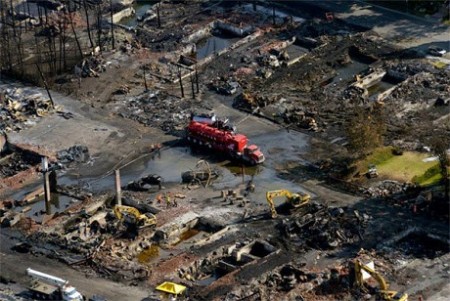New recommendations could make North Country railroad towns safer
Yesterday, the National Transportation Safety Board (NTSB) issued a series of recommendations to make transporting crude oil by rail safer; in an unusual move, the NTSB recommendations are in coordination with the Transportation Safety Board of Canada (here’s the NTSB’s press release on its recommendations).

Emergency service crews at work in the blast and fire zone of Lac-Mégantic in July, 2013. Photo: Sureté du Québec
The recommendations come after July’s Lac-Megantic disaster, which killed 47 people. An investigation by NCPR’s David Sommerstein last October found that the rail company CSX has been shipping hazardous liquids like crude oil through Canton and other towns on its Massena line using tankers federal regulators deemed “inadequate” 20 years ago.
In a statement this morning, North Country Congressman Bill Owens,who’s been urging railroad administrators to address these issues, responded to the recommendations thusly:
As we seek energy independence, we must make sure we are taking commonsense steps to protect communities near railroads where trains carry crude oil.We can find a sensible way to protect the public and the environment that allows businesses using our rail infrastructure to expand and create jobs. The NTSB’s coordination with their Canadian counterparts on these recommendations is a promising step forward. I will review these recommendations closely and continue working with my colleagues to make sure crude oil and other vital economic resources are safely transported on America’s railways.
Tags: csx, Lac-Mégantic, owens, railroad, safety








At last a glimpse into the fix to make railroad tanker cars more resistant to leaking in the “unlikely” event of a derailing accident of a train of crude oil laden cars; a rubber bladder and “government” oversight of the classification of the oil hazards being transported such that those of class I and II are rerouted via a less populated route as well as a requirement that the carriers have adequate response capabilities to address all levels of potential accidents.
The containment bladder limps into the better than nothing category; however, in a severe accident with leading derailed cars being rear-ended by following derailed cars I doubt that any of the NTSB accident investigation folks would anticipate a spill free scenario.
The requirement for more investigators, to track the veracity of oil and railroad hazard classifications, train routing and accident response capabilities in a political climate wherein the conservative mantra is less government regulation and more freedom for corporate interests to increase their profits, would appear to be a lost cause. One would be tempted to assume the requirements to be safe and responsible in the operations of such corporations would be at a level commensurate with those laid upon us regular folks; but, I reckon one would assume incorrectly if one were to do so.
The discovery that the oil in the tanker cars that derailed and killed 47 Canadians was improperly labeled class III so as to avoid the requirements of a Class I or II label might lead one to surmise that such labeling was intentionally accomplished. If this is correct there is no doubt in my mind that the decision to perform the improper labeling was made by a very low level agent/employee of the railroad, because who else would have any reason to direct such a dastardly deed other than someone who had absolutely nothing to gain from the act and could be removed from the corporate ledgers and hopefully incarcerated for the rest of his/her days (what better way to keep them quiet and non relevant) and inflict virtually no economic, operational or technical impact upon said corporation.
How do we solve these quandaries in as much as more unenforceable regulations provide no likely solution? Ah ha, how about this: every oil train will be required to have a sleeper type car (similar to the old Pullman cars) embedded at the midsection of the oil car string and within that car will be a member of the board of either the shipping oil company or the transporting railroad company and no train will be allowed to leave the rail yard without such car and personage on board. Additionally a GPS transponder would be attached to the leg of such personage (all the better to track such person) with such a mechanism that removal of it shall immediately disgorge an electronic signal which would lock the brakes on the train. Any likelihood that a train so outfitted would be carelessly parked, over-sped or in any way operated so as to endanger the “significant” patron in the sleeper car? Not likely and not likely that such a scenario would ever occur; therefore if it is that petroleum powered locomotion is a continued desire of the people I reckon we will just have to keep on taking our chances with the rail/oil status quo.
“The requirement for more investigators, to track the veracity of oil and railroad hazard classifications, train routing and accident response capabilities in a political climate wherein the conservative mantra is less government regulation”. perhaps this is the conservative mantra but regulations are on the rise. look at the stats, not the rhetoric.
Bill’s statement is disingenuous: “As we seek energy independence, we must make sure we are taking commonsense steps to protect communities near railroads where trains carry crude oil.”
The use of railroad tankers deemed inadequate twenty years ago has nothing to do with energy independence. It is about maximizing profit.